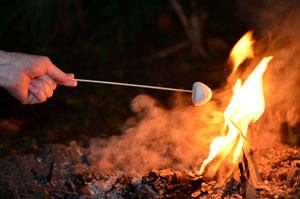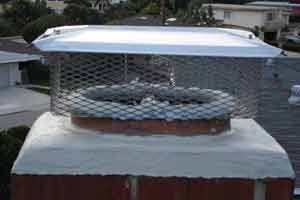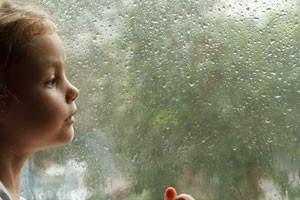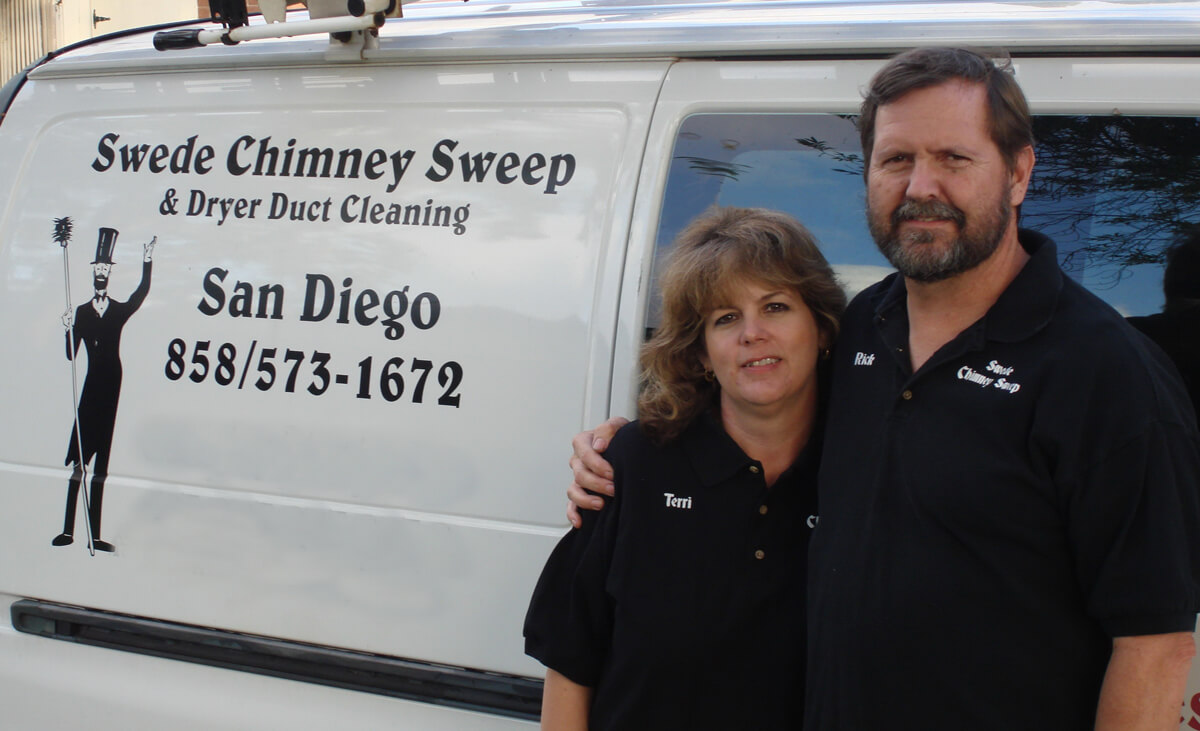 There’s nothing better than a warm, cozy fire in the fireplace but there’s nothing worse than the “campfire-in-the-living-room” smell that can sometimes occur afterwards. Understanding some of the causes for a stinky fireplace will help prevent the problem. There are several key causes for fireplace odor issues.
There’s nothing better than a warm, cozy fire in the fireplace but there’s nothing worse than the “campfire-in-the-living-room” smell that can sometimes occur afterwards. Understanding some of the causes for a stinky fireplace will help prevent the problem. There are several key causes for fireplace odor issues.
1) Smoking Problems
Sometimes a smoking problem is so subtle that you may not even realize it at the time of the fire but then you notice a bad odor the next day. That’s because smoke rises to the highest part of the house at the time of the fire but by the next day, that smoky odor drifts down into your breathing range. This smell can be absorbed into carpeting, furniture and window coverings so it’s important to avoid the smoking problem in the first place. To prevent smoking problems, check out our blog post on the Top 10 Smoking Problems and their Respective Solutions.
In addition, if you’re using your fireplace at night, the damper has to stay open all night. Hours later, halfway through the night when the fire is down to just burning embers, the chimney loses its draw, especially if the furnace turns on, pulling air down the chimney, resulting in the smoke and resulting odors coming into the room. To prevent this night-time issue, make sure your fireplace has tight-fitting glass doors.
2) Animals
Animals love your chimney because it is a dark place, safe from predators, but once animals enter chimneys, it’s extremely difficult for them to fly or crawl back out on their own. This might mean your chimney will smell of a nimal feces or worse, a dead animal. In fact, due to federal animal protection laws, there are heavy fines of up to $15,000 for removing live migratory birds without special animal-removal permits. To remove an unwelcome animal from your chimney, contact an animal removal organization with the proper permit, but the better way would be to avoid birds and other critters from using your fireplace as their new home in the first place by installing a chimney cap.
nimal feces or worse, a dead animal. In fact, due to federal animal protection laws, there are heavy fines of up to $15,000 for removing live migratory birds without special animal-removal permits. To remove an unwelcome animal from your chimney, contact an animal removal organization with the proper permit, but the better way would be to avoid birds and other critters from using your fireplace as their new home in the first place by installing a chimney cap.
3) Dirty Chimney
A dirty chimney can cause a bad fireplace odor because of the smoking problem but also even when the fireplace is not in use. Downdrafts push air down the chimney, bringing with it the smelly particulates from the dirty chimney and sending a campfire smell into the room. Having a CSIA Certified Chimney Sweep to sweep the chimney will help, but keep in mind that creosote can absorb into the porous material of a flue lining so even if a chimney lining is meticulously swept, there may still be a fireplace odor. Keeping the damper closed and installing tight-fitting glass doors will help.
4) Type of Fuel
Burning wood that has not been aged long enough or has been left out in the rain will create a smokier fire which can cause a rank odor. Some people can also be very sensitive to the petroleum odor of certain brands of prefabricated logs. In this case, change your fuel type and make sure that wood is aged and kept dry.
5) Pressurization in the home
To make our homes more energy efficient, builders are making houses “tighter.” Tight homes don’t make for properly-operating fireplaces. Fire needs oxygen, a great deal of oxygen, and it pulls it from the room. If a fire can’t get that oxygen because your fireplace is competing with other systems in the home such as furnaces, clothes dryers, bathroom exhaust fans or kitchen hoods, pressurization problems will occur in the home and can create a smoking problem or fireplace odors. Even if the fireplace isn’t in use, these other systems will draw air down the chimney, pulling down the particulates from a dirty chimney or odors from the ashes in the fireplace. Wind-driven downdrafts will also create this effect. Even during the summer, when fireplaces aren’t being used, rainy weather or high humidity can bring fireplace odors into the house. We recommend closing the damper, keeping the firebox clean, installing tight-fitting glass doors on the front of the fireplace or creating another method to bring make-up air into the home.
6) Rain/Water intrusion
 Rain falling down a masonry chimney doesn’t land directly in the firebox. Instead, because of the way a masonry chimney is designed, this rain lands in an area behind the damper called a smoke shelf unless the chimney has a cap. The rain collects in the smoke shelf until the water eventually evaporates. This rain water mixes with soot and can have a rancid, musty odor. This is another good reason to have a chimney cap on the top of the chimney.
Rain falling down a masonry chimney doesn’t land directly in the firebox. Instead, because of the way a masonry chimney is designed, this rain lands in an area behind the damper called a smoke shelf unless the chimney has a cap. The rain collects in the smoke shelf until the water eventually evaporates. This rain water mixes with soot and can have a rancid, musty odor. This is another good reason to have a chimney cap on the top of the chimney.
Fireplace odors are a common problem but with a little knowledge, odors can be avoided, decreased or completely eliminated. Reduce smoking problems, have your chimney swept regularly, install tight-fitting glass doors, provide make-up air in tight homes to prevent pressurization problems, and install a cap to keep out rain and animals. Then sit back and enjoy your fireplace without the smell of regret the next day. After all, the smell of a campfire can be enjoyable on a camping trip, but not in your living room!

We have a home built in the late 1940s and live in New England. the fireplace which we love is on an outside wall. over the past years whenever it is warm and humid we get a terrible fireplace odor back into the living room and must keep a small fan running pushing the air back up the flue. (vent open). We have had the fireplace cleaned two or three times, added caps to the top. Still problem on humid days. We got a new gas furnance about 10 years ago and also added central air, any chance the venting can be our problem, if so how do we check. Thank you so much for any advice
There are several factors that can create what I refer to as “stinky chimney syndrome” and this is not necessarily an uncommon problem in certain parts of the country.
It could be something as simple as the type of wood you’re burning. It could also be caused by a tight house, especially if you’ve installed new, air-tight or dual-paned windows. It could also be caused by a stack effect due to the pressurization in your home. One more factor could be downdrafts created due to living on a hillside or canyon or in an area of high winds. Each of these causes would have different solutions.
Because we are located in San Diego, California, we are not as familiar with the issues that you have there in New England. I would highly recommend contacting a CSIA Certified Chimney Sweep in your area. You can find one by going to the Chimney Safety Institute of America website at http://www.csia.org and put your zip code in the search box in the upper left corner. It’ll then give you a list of all the CSIA Certified Chimney Sweeps from closest to furthest away within a 50-mile radius.
Good luck to you!
Terri Pocock, Owner
Swede Chimney Sweep & Dryer Vent Cleaning
We live in a double wide with a factory installed wood stove; home built in 1998. We clean the chimney every year & use creosote remover during the burning season. We sometimes have to crack the window by the wood stove when starting a fire to prevent the room from filling with smoke – generally only when it’s raining or windy. This year for 1st time ever, we are also getting smoke smell once the fire is going well. We don’t see smoke in the room but definitely smell it. Looking for solutions ad we enjoy the fire & the relief from power bills during cold winter.
Crystal,
Many times an odor problem is a smoking problem. You may not notice it right away because the smoke goes up towards the ceiling. In fact, many times you notice it more the next morning when you go into the room. That’s because, during the night, the smoke has drifted down into the “breathing range.” Another cause is the fact that you live in a relatively new home that’s probably pretty tight. Cracking open a window at the beginning of a fire will help but you may need to crack it open the whole time you’re using your stove. Fire needs oxygen, not just at the beginning of the fire but all the way through. Lastly, you may want to check the wood that you’re burning. It may not be aged long enough or it may be wet. Also try a different type of wood to see if that’s the problem.
Contact a local Certified Chimney Sweep through the Chimney Safety Institute of America at http://www.csia.org . They be able to provide further insight.
We have put on a air tight damper on our chimney in addition to a new cold air return. I still can smell the Ash at times. Should we put on air seal fireplace doors? Will that help with the smell?
Stinky chimneys are one of the hardest issues to diagnose. It sounds like you may have a pressurization issue in your home. Ideally you need to determine the cause of the problem. Cleaning the chimney may help because the pressure problem is drawing in particulates of ash and creosote as well as odor into the room. If you have an air tight damper at the top, these particulates and odor can be sucked down the chimney and into the room. With the fact that you added a cold air return, this shows me that you have a tight house which can create a pressure problem. Glass doors won’t solve the pressure problem but may prevent the ash smell from entering the living quarters, but there is no guarantee. To find a chimney sweep in your area, go through the Chimney Safety Institute of America at http://www.csia.org .
I hope this information helps you!
Terri Pocock, Owner
Swede Chimney Sweep & Dryer Vent Cleaning
San Diego, CA
You should never have your furnace on at the same time as your fireplace. Here is a blog post I wrote about this common issue:
http://swede.kikawebdesign.com/fireplace/an-easy-solution-for-fireplace-smoking-problem/
If you’re having an odor problem coming from your chimney when you’re not using the fireplace but your furnace is on, close the damper on the chimney and/or close the glass doors on the fireplace (if you have glass doors). Here is a blog post about chimney odors which is also a common issue:
http://swede.kikawebdesign.com/fireplace/six-causes-fireplace-odors/
I hope this helps!